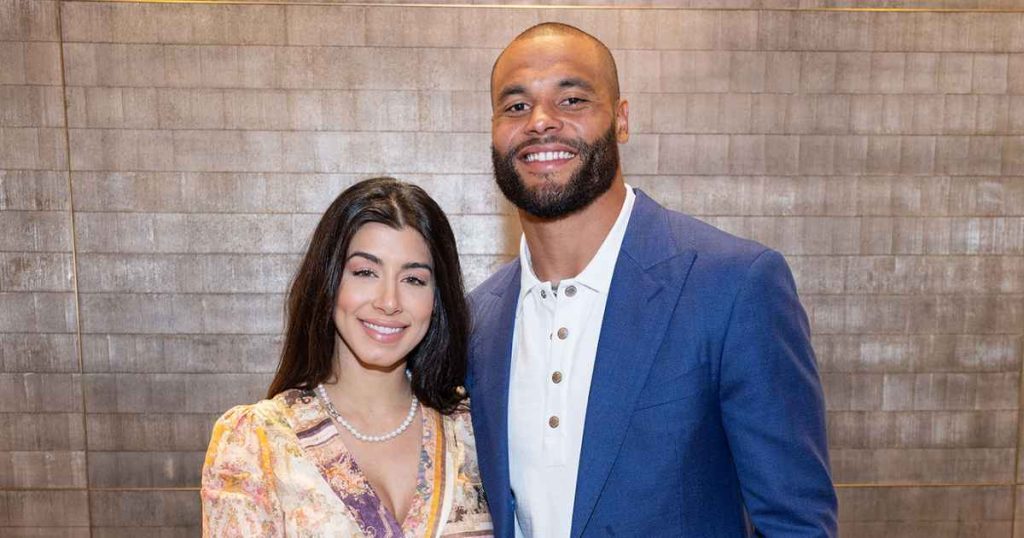The rise in burglaries targeting professional athletes has become a concerning trend, with recent incidents highlighting the vulnerability of high-profile individuals, even within seemingly secure environments. The theft of $40,000 worth of valuables from Sarah Jane Ramos, fiancée of Dallas Cowboys quarterback Dak Prescott, serves as a prime example of this escalating problem. Ramos’s experience underscores the brazen nature of these crimes, with thieves exploiting a momentary lapse in security – an unlocked car door during a brief dash inside to escape the rain – to abscond with a significant amount of luxury goods, including designer handbags, wallets, computer software, and cash. Adding insult to injury, Ramos’s credit cards were subsequently used at another location, indicating a level of organization and preparedness on the part of the perpetrators. This incident aligns with a broader pattern of burglaries targeting athletes, including prominent figures like Joe Burrow, Travis Kelce, and Patrick Mahomes, raising concerns about the methods and motivations behind these targeted attacks.
The Federal Bureau of Investigation (FBI) has acknowledged the growing threat, issuing warnings to sports leagues about organized theft groups specifically targeting athletes. These groups, often originating from South America, are known for their meticulous planning and execution. They conduct extensive surveillance on their targets, gathering information about their residences, schedules, and security measures. This intelligence allows them to identify vulnerabilities and execute swift, efficient burglaries, often bypassing sophisticated alarm systems and disabling security cameras. The FBI’s report details the groups’ advanced tactics, including the use of Wi-Fi connections to monitor activity within the targeted homes and the deliberate obfuscation of their identities to avoid detection. The level of sophistication displayed by these groups suggests a highly organized and professional operation, raising alarms within the sports community and prompting calls for increased vigilance and security measures.
The FBI’s recommendations for athletes emphasize proactive security measures, including maintaining detailed records of valuable possessions and exercising caution on social media platforms. Sharing personal information online, such as travel plans or home locations, can inadvertently provide valuable intelligence to potential thieves. The agency also encourages athletes to remain vigilant for any suspicious activity around their homes and to report any concerns to law enforcement immediately. These precautions highlight the need for a heightened sense of awareness and a proactive approach to personal security in the face of this growing threat. The targeting of athletes underscores the unique vulnerabilities associated with their high-profile status, requiring a tailored approach to security that addresses the specific risks they face.
Joe Burrow, quarterback for the Cincinnati Bengals, experienced a similar invasion of privacy when his Ohio home was burglarized while he was playing a Monday Night Football game in Texas. The incident, reported by Olivia Ponton, who was at the residence at the time, involved a shattered bedroom window and a ransacked room. The call to 911 painted a picture of fear and uncertainty, as Ponton sought guidance on how to respond to the unfolding situation. While the details of the relationship between Burrow and Ponton remain somewhat unclear, the incident highlighted the potential danger and emotional distress caused by these home invasions. Burrow subsequently addressed the incident publicly, expressing his frustration over the violation of his privacy and the dissemination of personal information. His statement reflects the broader concern among athletes about the intrusion into their personal lives and the need for greater protection.
These targeted burglaries represent a significant concern for professional athletes, who often possess valuable assets and maintain high-profile lifestyles. The organized nature of these theft groups, coupled with their sophisticated methods, necessitates a proactive and multi-layered approach to security. Athletes must be vigilant in protecting their personal information, both online and offline, and should implement robust security measures in their homes. Cooperation with law enforcement and security professionals is crucial in identifying and apprehending these criminal groups. The FBI’s warnings and recommendations provide a valuable framework for athletes to enhance their security protocols and mitigate the risk of becoming targets.
The incidents involving Sarah Jane Ramos and Joe Burrow underscore the growing threat of targeted burglaries against athletes. These incidents are not isolated events but rather indicative of a wider trend that requires a concerted effort from athletes, sports leagues, and law enforcement agencies to address. The sophisticated tactics employed by these organized theft groups necessitate a proactive approach to security, emphasizing vigilance, preventative measures, and the responsible use of social media. By adopting a comprehensive security strategy, athletes can better protect themselves, their families, and their belongings from these increasingly sophisticated and brazen criminal operations. The ongoing dialogue between law enforcement and the sports community is essential in developing effective strategies to combat this evolving threat and ensure the safety and security of professional athletes.

